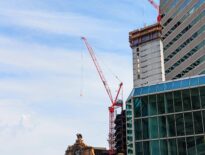Elischia Fludd
Executive Director, Massachusetts Climate Action Network
Age: 40
Industry experience: 20 years
Climate change is prompting Massachusetts to reexamine fundamental questions about where buildings can be developed, how they’re designed and how they operate. New decarbonization regulations are being steadily adopted by dozens of communities, reducing a major source of greenhouse gas emissions but also potentially adding costs that intensify Massachusetts’ high housing prices. Pressuring officials to address climate change with an equitable approach is a top priority of Elischia Fludd, the newly appointed executive director of the Massachusetts Climate Action Network. The New York native has been active in social causes including poverty eradication and domestic violence prevention during a 20-year career. At MCAN, she leads the push to pressure Beacon Hill and local town halls to enact policies that make development more sustainable, while minimizing impacts on lower-income populations. Fludd prepares to relocate to Massachusetts following her recent completion of graduate studies in global affairs and sustainable development at University of Notre Dame.
Q: How can public sector policies minimize the disparate impacts of climate change on underrepresented communities and neighborhoods in Massachusetts?
A: How we do it is really complex. The best practices for the public sector is to include an equity analysis during planning, evaluation and implementation, and make sure that part of the analysis is that diverse voices have equal decision-making in the process. That’s really part of the intentionality, providing a structure that’s needed for the vulnerable to receive what they need. As we think about these neighborhoods and how they’re built, that’s an issue that connects to a climate-resilient economy.
Q: What is the role of direct action as a strategy in climate campaigns?
A: In general, direct action is a choice. It’s the right of climate activists and they can employ it at their discretion, but really it’s the cornerstone of our democracy. Climate change is not just imminent. It’s already here. We know it will get worse. We recognize we must keep the urgency on the systems. Change is needed and direct action is one way to draw attention to it, if we want to thrive as a society. We know the consequences of climate change touch all of us, regardless or who we are and where we are. Direct action is a way to keep attention where it needs to be focused.
Q: What’s the network’s reaction to Gov. Healey’s climate initiatives thus far, including the creation of a statewide climate bank?
A: In general, MCAN is aligned in solidarity with any initiative that’s going to unburden people and the built environment from pervasive social and economic consequences that come from climate change. We support ideas that adapt and strengthen the ecosystems that support the built environment. We acknowledge the strides the governor is taking, and we continue to work as accomplices.
Q: How does an organization like MCAN balance the advocacy for things like new building standards that could drive up housing costs versus minimizing effects on vulnerable populations?
A: The key for these kinds of things as well is not just making sure you have the thresholds in place, but making sure the follow-up makes sense for peoples’ lived experience. Having a threshold sometimes is not as effective. That’s where the research comes in, talking to a lot of partners as we go into communities and listen, we have a better sense of how to advocate and educate the public moving forward.
Q: One of MCAN’s top legislative priorities is supporting a bill that requires a study of embodied carbon impacts for potential future state regulation. What is the goal of that proposal?
A: Overall, our priorities to reduce carbon emissions and establish funds for clean energy transitions target the highly impacted communities in the state so that no one is left behind. We want to set the stage for substantive, tangible action upheld by bold, efficient processes and backed by significant funds.
Q: What is your reaction to the resiliency strategy for the Dorchester Bay City development?
A: In general, the key for any type of development is how not only the structures, but also the materials are used and how resiliency is addressed to prevent flooding. In this particular zone, it’s near a body of water. We like to have a focus on Massachusetts that creates these buildings that have a combination of contributing to healthier people with the materials used, but also the impact on the environment itself. Our role is advocacy, both upfront and behind the scenes, to make sure people are thinking about these things. We are not engineers. We know engineers and developers will make the choices with the information they have available to them. It’s our job to put out the information and translate the technical information and the know-how to think about things that are more equitable for people and the climate itself.
Fludd’s Top 5 Favorite Music Genres
- R & B
- Gospel
- Classic Rock
- Afrobeats
- Salsa




 |
| 

